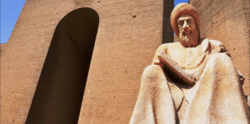Ibn al-Mustawfi
Mubarak Ibn Ahmad Sharaf al-Din Ibn al-Mustawfi al-Lakhmi al-Irbili[1][2] (Arabic: مبارك بن أحمد شرف الدين اللخمي الإربيلي b. 1169 – d. 1239), a famous Muslim historian of Erbil, who was born in the ancient citadel of Erbil. He has written in several areas, history, literature and language. His masterpiece is a four volumes book of (History of Erbil).[3][4]

Ibn Khallikan said about him in his book Wafayat al-Ayan: "He was a dignified person, he had great humility, broad generosity; every virtuous person who visited Arbil hastened to visit him, he had great virtues and was knowledgeable in many arts".
Biography
He was born in the Castle of Erbil and grew up in the house of the Leadership and science, his father and uncle were his teachers when he began his education, and his father encouraged him to go to the scholars of Erbil to continue his education. He studied rhetoric, and learned everything related to it, he was also interested in science of language and literature.
He was a poet and minister in Erbil, he was the vizier of Muzaffar ad-Din Gökböri, governor of Erbil in the reign of Sultan Saladin, and subsequently independent ruler of Erbil.[5]
In the year 1236, after the death of Gökböri, Ibn al-Mustawfi moved to Mosul following the Mongol sacking of Erbil, and lived there until his death in 1239.
List of works
- Tārīkh Irbil: al-musammā Nabāhat al-balad al-Khāmil bi-man waradahu min al-amāthil, four volumes.
- Kitab al-Nizam fi shi'ar al-Mutanabbi wa abi Tammam, ten volumes.
- Kitab ithbat al-muhasaal fi nisbet abyat al-mufasaal, two volumes.
- Kitab sr al-Sanaah
- Kitab aba qimash, a collection a lot of literature and anecdotes.
- Kitab Ahkam al-Nijoom
- He also wrote a collection of poems.
References
- Al-Dhahabi. "Siyar A'lam al-Nubala'" (in Arabic). p. 49.
- Shafiq, Muna. "Reading in Ibn al-Mustawfi letters" (in Arabic).
- Ibn al-Mustawfī, Sharaf al-Dīn Abū'l-Barakāt Ahmad. Tārīkh Irbil: al-musammā Nabāhat al-balad al-Khāmil bi-man waradahu min al-amāthil. Edited by Sāmī ibn al-Sayyid Khammās al-Saqqār. 2 vols. Baghdad: Dār al-Rashīd li'l-Nashr 1980.
- History of Erbil
- Encyclopaedia of Islam, 'Begteginids': Encyclopaedia of Islam [spelling not a typo or incorrect], Second Edition First published online: 2012, P. Bearman, Th. Bianquis, C.E. Bosworth, E. van Donzel and W.P. Heinrichs (eds.), Brill, Leiden, Online version: section on the Begteginids First published online: 2012. First print edition (1960-2007): ISBN 9789004161214
- Ibn Khallikan (1 January 2013). Ibn Khallikan's Biographical Dictionary, Volume 1. Cosimo, Inc. pp. 389–. ISBN 978-1-61640-333-1.
- Julie Scott Meisami; Paul Starkey (1998). Encyclopedia of Arabic Literature, Volume 1. Taylor & Francis. pp. 314–. ISBN 978-0-415-18571-4.
- Ahmad al-Ghazali, Remembrance, and the Metaphysics of Love